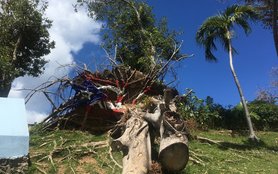Four countries on the Horn of Africa are in the grip of hunger emergencies; a stronger Feed the Future program could help prevent agonizing crises like these.
It might be the biggest catastrophe in the world that isn’t making headlines: the hunger crisis in East Africa. Year after year of climate disruptions—including drought in Kenya, Somalia, Ethiopia, and heavy rains in South Sudan—have raised the specter of mass starvation.
Climate change is a major driver of this disaster, but it’s not the only one. The pandemic has delivered economic shocks, locust infestations have wiped out crops, and armed conflict has prevented access to food and farms, forcing many to leave their homes in search of security and assistance. And with up to 90% of their wheat imported from Ukraine and Russia, East African countries that are struggling with severe food crises will likely face deadly consequences of the conflict in Ukraine.
The numbers are mind-numbing: in Ethiopia, Kenya, and Somalia, more than 23 million people are facing crisis levels of hunger, and a person is likely dying from acute hunger every 48 seconds.
A WIN—BUT WE NEED TO GO FURTHER
Last month, Oxfam joined a coalition of organizations, including Bread for the World, CARE, Mercy Corps, World Food Program USA, and World Vision, that called on Congress to take immediate action to address severe hunger in East Africa and other areas of the world. Policy makers heeded our collective voice and—with bipartisan support—passed legislation that allocated more than $5 billion to address global hunger. Now, food will reach some of the hardest-hit communities, cash distributions will help families buy food and other essentials in their local markets, and many of the people who have suffered devastating losses will have a chance to get back on their feet.
US government funds and programs will save lives in this crisis, but we need to act now to prevent future food emergencies.
In 2011, following the devastating famine in Somalia that killed more than a quarter of a million people, the international community said, “never again.” When catastrophe loomed again in 2016, the international community responded to the early warnings and succeeded in averting a famine.
Now, despite early warnings, another food crisis is upon us in East Africa. A new report—Dangerous Delay 2: The Cost of Inaction—(from Oxfam, Save the Children, and the Jameel Observatory) explains an important reason why: governments, aid providers, and their funders are still reacting to crises rather than taking strong action to prevent them.
We need to change that.
LOOK TO THE FUTURE
In the US, Democrats and Republicans must reauthorize and expand the Global Food Security Act (GFSA), which was designed to develop stronger food systems and prevent hunger crises like the one unfolding now in East Africa. Through a USAID program called Feed the Future, GFSA works with partners to train farmers, create opportunities for women, adapt to climate change, increase yields, and more.
The legislation is due for reauthorization—but simply renewing it isn’t enough. Feed the Future is currently active in only twelve countries; Congress needs to boost its funding and reach, to assist more areas facing critical needs. It can and should also undertake improvements: placing more emphasis on locally led programming would ensure that projects reflect the real needs and are tailored to each context; embracing principles of agroecology would contribute to sustainability; and putting more emphasis on the needs and leadership of women would benefit the affected communities in countless ways.
All will contribute to truly sustainable and shock-resistant development.
YOUR SENATORS AND REPS NEED TO HEAR FROM YOU—TODAY.
Let them know you want them to help prevent the next hunger crisis by expanding the Global Food Security Act (GFSA). Click here to add your name to our petition calling on Congress to reintroduce and enhance the GFSA.
###
In East Africa, Oxfam and the local organizations we work with aim to reach more than 1.5 million people with assistance that includes food, clean water, safe sanitation, cash, and shelter. We will continue to be engaged in protecting vulnerable groups in conflict-affected areas.



